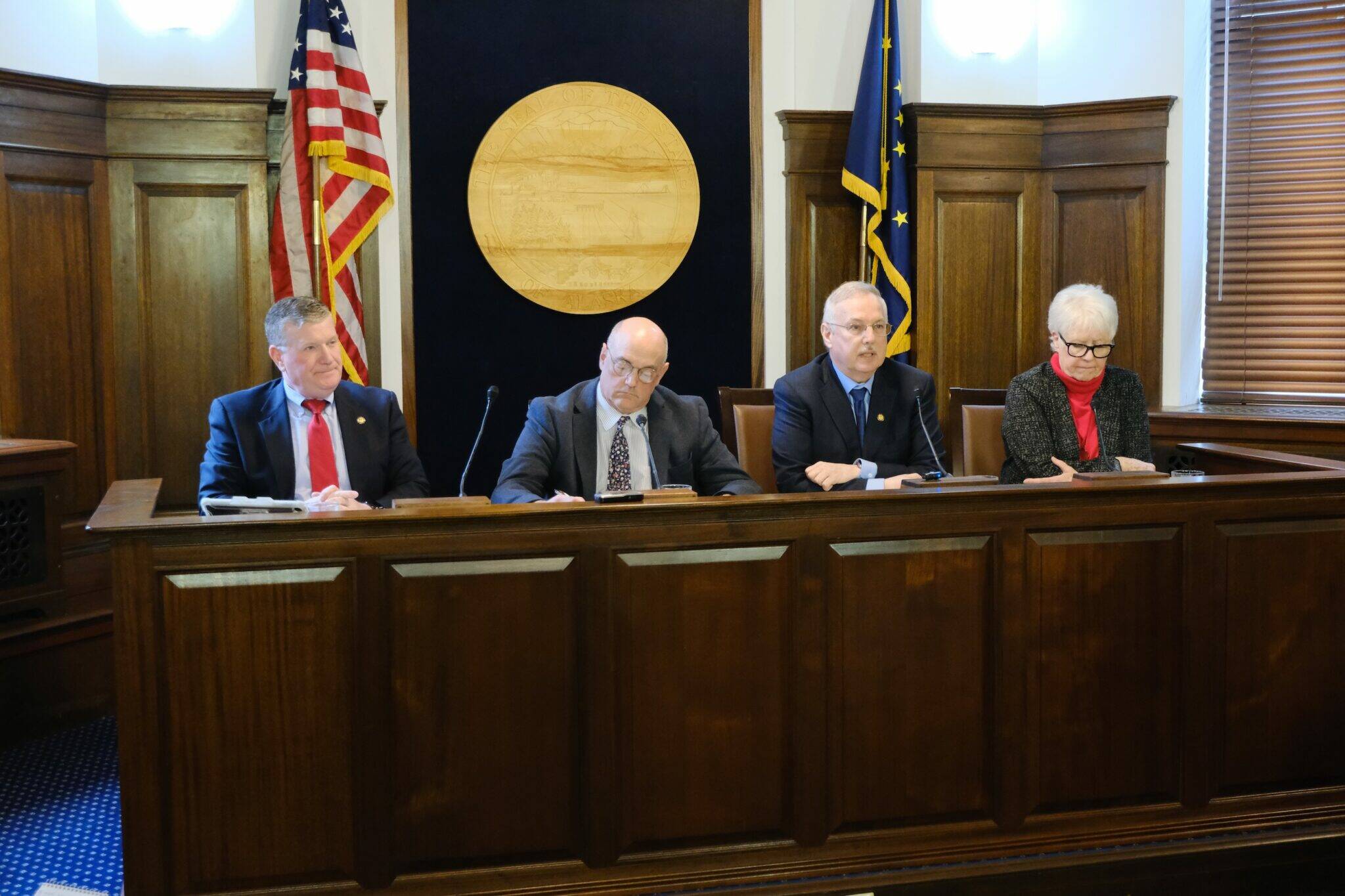Correction: Rep. Jimmie’s hometown has been corrected. Rep. Jimmie voted against an amendment to set the dividend at $1,000. The initial version of this article incorrectly stated that she supported setting the dividend at the statutory amount. She has not taken that position.
As Alaska faces economic shocks from a tumbling stock market and an unstable oil market, leaders of the state House of Representatives are appealing to minority-caucus members and Gov. Mike Dunleavy to help balance the budget.
“Ladies and gentlemen, we’re all in a pickle,” House Speaker Bryce Edgmon, I-Dillingham said in a news conference on Tuesday. “It’s not just the House majority: It’s the House minority; it’s the governor; it’s the Senate majority; it’s the Senate minority. We all own the situation in front of us.”
The House Finance Committee passed a budget on Thursday that includes $1.9 billion more in spending for the 12 months that begin in July than the state is forecast to raise. But Edgmon said that committee would continue to work on the bill to try to bring it into balance, as required by state law.
Edgmon, I-Dillingham, noted that the budget faces several challenges, including oil prices dropping over the past week. And he said the 21-19 split in the House meant that any one member has a veto power to block legislation. The House majority consists of 14 Democrats, five independents and two Republicans, while the minority has 19 Republicans.
“We need to work together,” Edgmon said of the House minority, before addressing the governor’s office: “Please step up. Work with us. We’ll get through this. But if you leave us to our own designs, we are going to be stuck in this morass that unfortunately will carry forward into what none of us want: And that’s a special session.”
Two majority finance committee members — Rep. Neal Foster, D-Nome, and Nellie Unangiq Jimmie, D-Toksook Bay — voted against a proposal to set the Permanent Fund dividend at $1,000. Foster supports a dividend at the level set under the formula in current law, which would be around $3,800 per resident and cost $2.46 billion. That size would make a balanced budget impossible without new taxes or significant draws from savings.
The value of the Alaska Permanent Fund fell by $3.2 billion, and Alaska North Slope oil fell from $76 per barrel to $65, in the days after President Donald Trump announced new tariffs.
Before the majority news conference, the House minority held one of their own. Finance committee members Rep. DeLena Johnson, R-Palmer, and Will Stapp, R-Fairbanks, both said the draft budget must be reduced. They raised the possibility of reexamining any new programs or positions that were added in the current budget, which started last July, or were proposed in the draft budget, including a hotly debated education funding increase.
“It’s hard work,” Johnson. “It’s drudgery. … It’s not one of those things you approach with a lot of excitement. You have to approach that with a lot of work.”
Stapp questioned the affordability of the proposed increase in the funding per student in public education. House Bill 69 includes a $1,000 per student increase in the base student allocation, the core of the state’s funding formula. For the next school year, that BSA increase would equal $253 million.
“Ultimately, you’re going to have to take the education funding level and say, you want to prioritize education, but you probably can’t do a $1,000 BSA,” Stapp said. He said the increase should look more like the one-time boost in state funding for the current school year, which was $680 per student. In terms of the total budget, that education funding increase was $174 million, compared with the $253 million in the draft proposal.
In the majority news conference, leaders of that caucus took a different view.
Majority Leader Chuck Kopp, R-Anchorage, said legislators shouldn’t even be raising the possibility of a Permanent Fund dividend using the formula in current law.
“I ran and campaigned on a balanced budget,” Kopp said, adding that he would have joined the other caucus if it agreed to a balanced budget and what he described as “the dividend we can afford.”
Kopp also emphasized that the majority is not proposing paying for a larger dividend with legislation to increase taxes or other revenue. He rejected increasing oil taxes, saying that the industry is still rebounding from the COVID-19 pandemic and he doesn’t want to discourage investment in future development.
Finance committee co-chair Andy Josephson, D-Anchorage, said the draft budget includes some growth driven by necessity. As an example, he cited funding for child advocacy centers to interview children who have been sexually abused. And he noted that most of the increase in the budget was proposed by Dunleavy, with additions for public employee contract increases.
Josephson described the education funding increase as a “core principle.”
“We heard from scores of Anchorage citizens about the importance of that, and we have their back,” he said. “Come hell or high water, we’re going to stand for that principle.”
The legislative session is scheduled to end by May 21. Special sessions have been called in 2017 and 2021 to avoid partial state government shutdowns, which would occur if there isn’t a budget enacted by June 30.
• Andrew Kitchenman has covered state government in Alaska since 2016, serving as the Capitol reporter for Alaska Public Media and KTOO before joining the Alaska Beacon. Before this, he covered state and local governments on the East Coast – primarily in New Jersey – for more than 15 years. This article originally appeared online at alaskabeacon.com. Alaska Beacon, an affiliate of States Newsroom, is an independent, nonpartisan news organization focused on connecting Alaskans to their state government.

